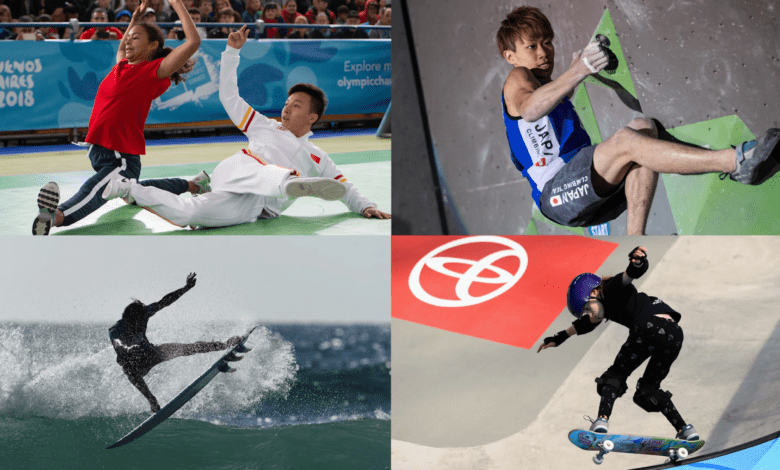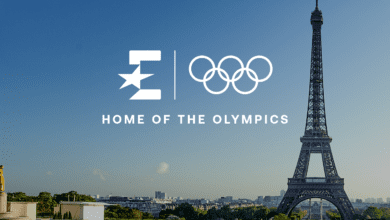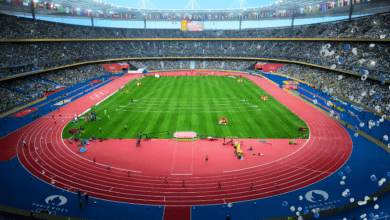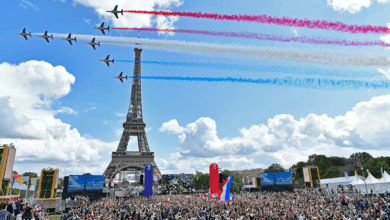Breaking Barriers: The Inclusive Olympics of Paris 2024

The Inclusive Olympics of Paris 2024 aims to break barriers and promote inclusivity in the world of sports. The organizers of the event have taken significant steps to ensure that athletes from all backgrounds, abilities, and identities have the opportunity to participate and excel in the games.
One of the key aspects of the Inclusive Olympics is the inclusion of Paralympic athletes alongside traditional Olympic athletes. The Paralympic Games, which were first held in 1960, showcase the extraordinary abilities of athletes with disabilities. By integrating the Paralympics into the larger Olympic event, Paris 2024 sends a powerful message of unity and equality, emphasizing that athletic talent knows no boundaries.
In addition to incorporating Paralympic athletes, the Inclusive Olympics of Paris 2024 places a strong emphasis on accessibility. The organizers have implemented measures to ensure that the venues, facilities, and services are accessible to athletes and spectators with disabilities. This includes wheelchair-accessible ramps, elevators, and designated seating areas. The aim is to create an environment where individuals with disabilities can fully participate and enjoy the games.
Furthermore, the Inclusive Olympics of Paris 2024 promotes inclusivity beyond physical ability. It encourages diversity and inclusion in terms of gender, race, ethnicity, and sexual orientation. The organizers have implemented policies to ensure equal representation and opportunities for athletes from various backgrounds. This includes initiatives such as promoting gender equality, combating discrimination, and fostering a welcoming and respectful environment for all participants.
By focusing on inclusivity, the Inclusive Olympics of Paris 2024 aims to inspire and empower individuals around the world. It seeks to challenge societal norms, break down barriers, and create a more inclusive and accepting world through the power of sports. The event serves as a platform to celebrate diversity, showcase the incredible achievements of athletes, and drive positive social change.
Overall, the Inclusive Olympics of Paris 2024 sets a new standard for inclusivity in the realm of sports. It demonstrates the potential for sports to bridge gaps, unite people, and promote equality. Through its commitment to breaking barriers, this event represents a significant step forward in creating a more inclusive and accessible world for all individuals, regardless of their abilities, identities, or backgrounds.

The Inclusive Olympics of Paris 2024
The Olympic Games have always been a symbol of unity, bringing together athletes from all over the world to compete in a spirit of fair play and sportsmanship. However, for years, athletes with disabilities have been marginalized in the sporting world, with separate games and competitions that were seen as second-class events. But now, the Inclusive Olympics of Paris 2024 are set to change all that.
The Inclusive Olympics is a groundbreaking initiative that aims to make the Olympic Games more inclusive and accessible to athletes with disabilities. The games will feature a wide range of events, from athletics and swimming to wheelchair basketball and sitting volleyball. The aim is to create a platform for disabled athletes to showcase their skills and compete on an equal footing with their able-bodied counterparts.
But the Inclusive Olympics are about more than just sport. They are a celebration of diversity and inclusion, and a reminder that everyone, regardless of ability, has the right to participate in the world around them. The games will be a beacon of hope for millions of people with disabilities around the world, showing them that they too can achieve greatness and break down barriers.
The History of the Paralympic Games

The Paralympic Games have a rich history that dates back to the mid-20th century. Here is an overview of the key milestones and developments in the history of the Paralympic Games:
- Origins: The roots of the Paralympic Games can be traced back to the aftermath of World War II. Dr. Ludwig Guttmann, a German neurologist, organized the Stoke Mandeville Games in 1948. These were initially meant to provide rehabilitation through sports for veterans with spinal cord injuries.
- Expansion: The Stoke Mandeville Games gained popularity and attracted participants from other countries. In 1960, the event expanded internationally when the first official Paralympic Games were held in Rome, Italy. It featured 400 athletes from 23 countries, competing in eight different sports.
- Integration with the Olympics: The Paralympic Games gained recognition when, in 1988, they were held in the same host city as the Olympic Games. The Seoul Paralympics marked the beginning of a partnership between the International Olympic Committee (IOC) and the International Paralympic Committee (IPC). Since then, the Paralympic Games have taken place in the same host city and venues as the Olympic Games.
- Inclusion of More Disabilities: Over the years, the Paralympic Games expanded to include athletes with various disabilities, beyond spinal cord injuries. The categories of impairments were redefined, and new classifications were introduced to accommodate athletes with different physical, sensory, and intellectual disabilities.
- Growth and Recognition: The Paralympic Games experienced significant growth in terms of the number of participating athletes, sports, and global recognition. The games became more widely televised, attracting larger audiences and promoting awareness and understanding of disability sports.
- Winter Paralympics: In addition to the Summer Paralympic Games, the Winter Paralympics were introduced in 1976, held in Örnsköldsvik, Sweden. The Winter Paralympics follow a similar format, featuring adaptive winter sports such as skiing, snowboarding, and ice hockey.
- Increasing Professionalism: The Paralympic Games have become increasingly professionalized over time. Athletes train rigorously, and advancements in sports equipment and technology have contributed to improved performances and records being set at each edition of the games.
- Social Impact and Advocacy: The Paralympic Games have played a vital role in promoting disability rights, inclusivity, and breaking down societal barriers. The games highlight the abilities and achievements of athletes with disabilities, challenging perceptions and stereotypes associated with disability.
Today, the Paralympic Games are a global sporting event, held every four years in the same host city as the Olympic Games. They continue to inspire individuals with disabilities worldwide, fostering a more inclusive society and encouraging participation in adaptive sports.
Why the Inclusive Olympics Matter?
The Inclusive Olympics matter for several important reasons:
- Promoting Inclusion and Equality: The Inclusive Olympics emphasize the principles of inclusivity and equality in sports. By providing equal opportunities for athletes from diverse backgrounds, abilities, and identities, the games challenge societal norms and promote a more inclusive and accepting world. They send a powerful message that everyone deserves the chance to participate and excel in sports, regardless of their differences.
- Breaking Down Barriers: The Inclusive Olympics aim to break down barriers that have historically excluded certain individuals or groups from participating in sports. These barriers can be based on disability, gender, race, ethnicity, sexual orientation, or socioeconomic status. By actively working to dismantle these barriers, the games create a more level playing field and open doors for athletes who may have faced discrimination or limited opportunities in the past.
- Inspiring and Empowering Individuals: The Inclusive Olympics serve as a source of inspiration and empowerment for individuals around the world. Athletes who compete in these games demonstrate remarkable determination, skill, and resilience, showcasing what can be achieved despite facing obstacles. Their stories and achievements inspire others to pursue their dreams, challenge societal limitations, and strive for excellence in their chosen fields.
- Changing Perceptions and Challenging Stereotypes: The Inclusive Olympics challenge stereotypes and change perceptions about what individuals with disabilities or from marginalized communities can accomplish. By highlighting the abilities, strengths, and achievements of diverse athletes, the games challenge preconceived notions and encourage a shift in public attitudes towards greater acceptance and appreciation of human diversity.
- Driving Social Change: The Inclusive Olympics have the potential to drive meaningful social change beyond the realm of sports. Through their inclusive practices and messaging, they can influence public discourse, policy-making, and cultural attitudes. The games can foster dialogue, raise awareness, and promote positive action towards creating more inclusive societies that value and respect the rights and abilities of all individuals.
- Legacy and Long-Term Impact: The impact of the Inclusive Olympics extends beyond the duration of the games themselves. Hosting inclusive sporting events can leave a lasting legacy in terms of infrastructure, accessibility improvements, and long-term support for disability sports. They can inspire the development of inclusive policies, promote adaptive sports programs, and encourage continued investment in creating inclusive environments for athletes of all abilities.
In summary, the Inclusive Olympics matter because they champion inclusivity, equality, and social change. They provide a platform for athletes to showcase their talents, challenge societal barriers, and inspire individuals around the world. By embracing diversity and promoting equality in sports, the games contribute to a more inclusive and accepting society where everyone can participate and thrive.
Principles of the Inclusive Olympics
The Inclusive Olympics of Paris 2024 is a bold and revolutionary concept that is taking the world by storm. It is a concept that goes beyond mere physical competition and aims to promote social change by breaking down barriers and promoting inclusivity. At its core, the Inclusive Olympics is guided by a set of principles that are designed to ensure that everyone, regardless of their background or ability, is welcome and can participate in this momentous event.
One of the key principles of the Inclusive Olympics is accessibility. This means that all Olympic venues will be designed and built with accessibility in mind, ensuring that athletes with disabilities can compete on a level playing field. All venues will be equipped with ramps, lifts, and other assistive technologies to ensure that athletes with disabilities can access all areas of the venue.
Another important principle of the Inclusive Olympics is diversity. The organizers of the event are committed to promoting diversity in all aspects of the Games, from the athletes and the teams to the volunteers and the officials. They believe that the Inclusive Olympics is an opportunity to celebrate the diversity of the human race and to highlight the value of inclusivity in all areas of life.
The Inclusive Olympics is also guided by the principle of respect. The organizers of the event are committed to fostering an environment of mutual respect and understanding, where everyone is treated with dignity and compassion. They believe that the Inclusive Olympics is an opportunity to build bridges between different communities and to promote a spirit of cooperation and friendship.
Finally, the Inclusive Olympics is guided by the principle of sustainability. The organizers of the event are committed to ensuring that the Games are held in an environmentally sustainable manner, with minimal impact on the natural world. They believe that the Inclusive Olympics is an opportunity to promote sustainable living and to inspire people around the world to adopt more sustainable lifestyles.
Overall, the principles of the Inclusive Olympics are a testament to the power of sport to bring people together and to promote positive social change. Through its commitment to accessibility, diversity, respect, and sustainability, the Inclusive Olympics of Paris 2024 is set to be a truly historic event that will inspire generations to come.
The Inclusive Olympics of Paris 2024: What to expect
The Inclusive Olympics of Paris 2024 promises to be one of the most diverse and inclusive sporting events in history. With a renewed focus on equality and accessibility, the upcoming games will showcase athletes of all abilities and backgrounds competing on an international stage.
One of the key features of the Paris 2024 Olympics is the commitment to making the event accessible to everyone, regardless of their physical or intellectual abilities. This includes specialized facilities and services for athletes with disabilities, as well as training programs that promote inclusion and diversity.
In addition to the traditional Olympic events, the Paris 2024 games will also feature new sports that showcase the unique talents of athletes with disabilities. These events will allow for greater exposure and recognition of athletes with disabilities, helping to break down barriers and promote greater understanding and acceptance of people with different abilities.
The Inclusive Olympics of Paris 2024 will also have a strong focus on sustainability and social responsibility. The event organizers have committed to minimizing the environmental impact of the games, while promoting social and economic development in the local community.
Overall, the Inclusive Olympics of Paris 2024 promises to be a truly transformative event that celebrates diversity, inclusivity, and excellence in sport. Whether you’re a sports fan, a disability advocate, or simply someone who believes in equality and social progress, this is an event that you won’t want to miss.
Key events and competitions to look forward to
The Paris 2024 Olympic and Paralympic Games promise to be one of the most inclusive and diverse events in history. As we countdown to the games, there are some key events and competitions that we can look forward to.
One such event is the debut of the mixed-gender 4x400m relay in athletics. This event will see two men and two women compete together in a relay race. It is a significant step forward in gender equality in sports and will be an exciting event to watch.
Another event that has generated a lot of buzz is the inclusion of breakdancing as an Olympic sport. Breakdancing, also known as breaking, has its roots in hip-hop culture and is a highly acrobatic and expressive dance form. It will be interesting to see how this urban art form translates into a competitive sport and which countries and athletes will come out on top.
The Tokyo 2020 Paralympic Games saw the debut of badminton and taekwondo as Paralympic sports. Paris 2024 will continue to build on this momentum with the inclusion of Para-Table Tennis and Para-Taekwondo in the Paralympic program. These sports will provide new opportunities for athletes with disabilities to compete at the highest level and showcase their skills on the world stage.
With the Paris 2024 Olympics and Paralympics just around the corner, there’s plenty to be excited about. From new events and sports to increased diversity and inclusivity, the games promise to be a celebration of athleticism, culture, and humanity.
How the Inclusive Olympics are changing attitudes towards disability
The Inclusive Olympics of Paris 2024 are not just about creating a level playing field for athletes with disabilities. They are also changing attitudes towards disability in general. By showcasing the abilities of athletes with disabilities, the Inclusive Olympics are breaking down the barriers that have long stood in the way of inclusion.
For too long, people with disabilities have been seen as “less than” or “other.” They have been excluded from many aspects of society, including sports. The Inclusive Olympics are changing that. By including athletes with disabilities in the same competition as able-bodied athletes, the Inclusive Olympics are showing that disability is not a barrier to achievement.
The Inclusive Olympics are also helping to shift the narrative around disability from one of pity to one of admiration. Instead of focusing on what people with disabilities can’t do, the Inclusive Olympics are highlighting what they can do. By doing so, they are challenging stereotypes and promoting a more positive image of disability.
In this way, the Inclusive Olympics is not just a celebration of athletic achievement. They are also a celebration of diversity and inclusion. They are a reminder that we are all capable of great things, no matter what our abilities or disabilities may be.
The role of technology in making the Inclusive Olympics accessible
Technology has played a crucial role in making the Inclusive Olympics accessible for everyone. With the advancements in technology, there are numerous ways to assist and support athletes with disabilities to compete in the games. One of the most important technological advancements in this regard is the development of assistive technology. Assistive technology has made it possible for athletes with disabilities to participate in sports and perform at their best. For instance, prosthetics have enabled amputee athletes to compete in running events, while hearing aids have helped hearing-impaired athletes to communicate effectively with their coaches and teammates.
Another way technology has made the Inclusive Olympics accessible is through the use of virtual reality. Virtual reality has made it possible for athletes to train and practice in a simulated environment that mimics the actual competition. This technology has been particularly helpful for athletes with mobility impairments, as it allows them to practice their sport in a safe and controlled environment.
In addition, the use of communication technology has enabled athletes with disabilities to communicate effectively with their coaches and teammates during the games. This has been particularly helpful for athletes with speech and language disabilities, as they can use communication devices to communicate their needs and strategies.
Overall, technology has played a crucial role in making the Inclusive Olympics accessible for all athletes. With the continued advancements in technology, we can expect even more innovative solutions to support and assist athletes with disabilities in the future.
The legacy of the Inclusive Olympics: Inspiring the next generation
The legacy of the Inclusive Olympics is not just about celebrating the achievements of athletes and breaking down barriers in the present. It is also about inspiring the next generation to continue the journey towards a more inclusive society.
Through showcasing athletes with disabilities, the Inclusive Olympics of Paris 2024 will inspire those who may not have seen themselves represented in the sporting world before. Young people with disabilities will be encouraged to pursue their dreams and aspirations, knowing that they too can compete at the highest level.
The Inclusive Olympics will also promote the importance of accessibility and inclusivity in all areas of life, not just in sports. This will encourage the next generation to think more consciously about how they can make their communities more inclusive and accommodating for everyone.
The legacy of the Inclusive Olympics will continue long after the games are over. It will inspire a new generation of athletes, advocates, and leaders who will continue to break down barriers and promote inclusivity in all aspects of society.
Conclusion
In conclusion, the Inclusive Olympics of Paris 2024 is not just an event, it’s a movement towards breaking down barriers for all. It’s a celebration of diversity and inclusivity, and it’s an opportunity to showcase the amazing talents of athletes with disabilities.
As a society, we must recognize the importance of inclusion and accessibility, not just in sports but in all aspects of life. We must work towards creating a world where everyone can participate and be celebrated for their abilities, not just their disabilities.
Therefore, it’s our responsibility to support the Inclusive Olympics and other similar initiatives that promote diversity and inclusion. We can do this by spreading awareness, volunteering, donating, or simply by attending the event and cheering on the athletes.
In conclusion, let’s break down barriers for all and support the Inclusive Olympics of Paris 2024. Let’s make sure that everyone, regardless of their abilities, can feel included and celebrated. Together, we can create a more inclusive world.





